#we do nothing in this class!!!!
Text


very self indulgement things for myself uhhh... when shes super drunk she need a personal boob to rest.
#EEEEEEEK is this a safe place#and im meaning for sniperpauling#cuz this was totally meant for shipp purposes...#but nothing have to be romantic its also for sillies nothing serious#just letting yall know this will be shipp tagged anyways#sniperpauling#pyropauling#pyro#sniper#miss pauling#team fortress 2#tf2#kino art#hello sniperpauling fans... how are we doing#i am not failing anymore my uni classes so this was a sort of celebration for myself#i am cringe but free#edit: piss mauling here
550 notes
·
View notes
Text
i think western celebrity worship culture is such a strange prison. Free yourself. You will become an entirely different person if you just let go of these people who will never care about you, about us as a whole. Go for a walk. Read a book. Paint, dance, forget about them. go watch a foreign film. go watch an old film or an indie film from a director you've never heard of. Look at all the different faces. Find peace in the fact that you recognize none of them.
#personal#they are part of an oppressive class and we should want nothing to do with them#celebrity worship#celebrity culture
339 notes
·
View notes
Text
Oh Sklonda's righteous fury hits so hard, as a kid who WAS taken advantage of in many ways by her friends when she was in school, and whose mom tried to tell her they were being unkind and who didn't believe her until she got kinder friends
#christina liveblogs#for me it was middle school so i know we've all grown up#i wish those people nothing but the best in life#but absolutely time and again my generosity was taken advantage of#i got teased for my naivety#my mom loaned a friend $20 when she said she lost it as we were driven to the movies#she found her cash and instead of giving my mom her $20 back we went to the mall with $40#i sat alone at a friend's house while they went to smoke weed in the garage bc i was Very much not the stoner i am now#and when we got to high school and i made friends with kids from my theater class#THEATER KIDS!!!#my middle school emo friends got upset bc i was being 'normal now'#they were not always good friends to me#and i was just like riz insisting it was fine i loved them they werent doing anything wrong#sklonda is right to be pissed and i love her for it#fhjy#fhjy spoilers#d20 spoilers#d20#fantasy high#sklonda gukgak#riz gukgak
319 notes
·
View notes
Text
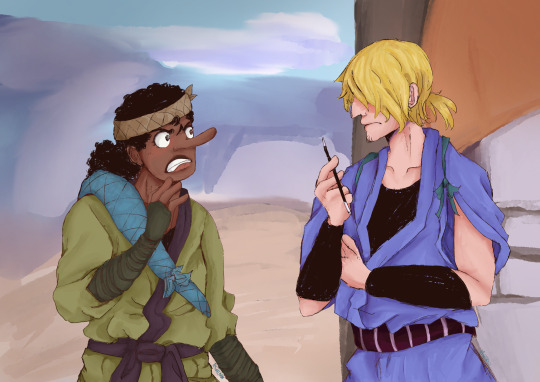
probably won't finish this but yay screenshot redraw
what are they even gossiping about
#trying to get used to procreate im kinda sad that i can't recreate some brushes from ibis perfectly but sigh we ball!!!#it's been fun tho :3 super cool app i don't regret getting it#it changed my style up a little cuz of the colouring technique but idk i hope it looks ok#USOPP ISNT MEANT TO BE MAD BHKJFD im posting this as a wip but i still hav e the urge to fix things up but i have class in like 5 mins ARGH#he's just very passionately shit talking#or whatever they were doing in the screencap i forgor (it was just sitting in my gallery)#op#one piece#sanji#usopp#boss luffy historical special#edo period#sanuso#usosan#okkk nothing shippy ab this art ik but when i was drawing it i was like hehe boyfriendsss so it counts. TO ME#black leg sanji#vinsmoke sanji#art#mintart#my art
134 notes
·
View notes
Text

I have endured what no one on earth has ever done before
I put my lips to the hands of the man who killed my son
#deltarune#gaster#deltarune player#i love still headcanoning gaster as sans and papyrus's dad despite knowing that he saw everything that happened in undertale (including#the no mercy route) and seeing how friendly he is with us in deltarune#you would think he'd hate us and want do nothing to do with us or to hurt us but. he wants to create a new future with us.#he thinks that our search for him is a wonderful thing. he thinks we created a wonderful form. hes thankful for our time.#knowing this while still believing he's the father of characters we've killed makes him such an interesting character#we know he's tied to undertale so regardless of if he's actually their dad or not we have hurt people he knows#and he still treats us with so much care#i love this guy. i wanna know him already#this was fully inspired by a gorgeous drawing by WolfyTheWitch on twitter#of. actual priam jskdjdk#this was drawn using my poor poor pilot pens during classes over three days. i need to buy new ones now lol#i need to use this technique more often#its super time consuming but it looks so cool. and the paper has such an interesting texture now :]]]#i also LOVE drawing gasters hands all melting and barely even like hands#and brown paper packages tied up with string#my art#*i edited this a bit in digital i forgot to mention that gdjdjfk
376 notes
·
View notes
Text
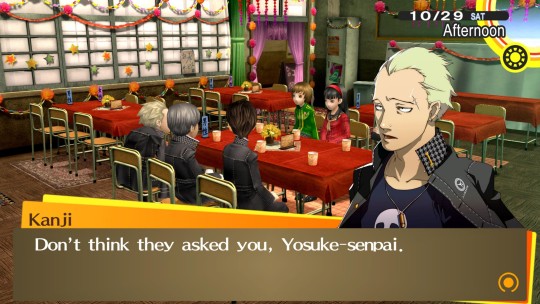

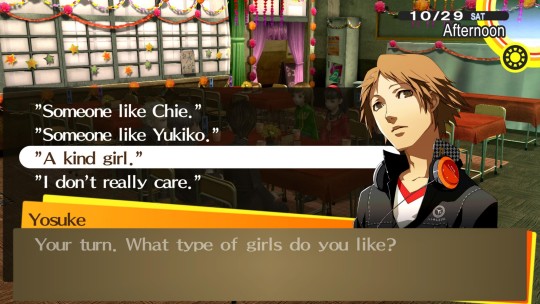
#p4#p4g#persona 4#persona 4 golden#hanamura yosuke#yosuke hanamura#souyo#soooooooooo we gonna talk about how yosuke enthusiastically jumps in to tell yu that hes the same#so ive already talked a million times about how yu and yosuke's types are basically each other and that how their r/s is so defined by their#attraction to each others kindness and reliability and all that but im just#kanji's expression is sending me here LFMAO especially because kanji is low key the one that kind of points out their closeness the most#tatsumi “hey let me in on this conversation” kanji#tatsumi “whos your partner now!” kanji#1000% kanji knows they're into each other he knows they're flirting without realising they're flirting#like never ever forget kanji's own sensitivity to the people around him and HE KNOWS. WHATS. UP.#but also the way no one else except kanji intervenes lmao#lmao i think chie yukiko and their class president are just really used to what souyo are like together (embarrassing not-pda pda)#so theyre just ah business as usual theyre doing that thing again. this is minor. trivial in the grand scheme of everything else they do#its got nothing on them passing notes or the way yu turns around to smile at yosuke and yosuke smiles back and they just sit there smiling#at each other in absolute silence. their classmates know to just walk around them and leave them alone.#class prez knows if he has to tell one of them its their turn on duty its a lost cause. they'll make up for it later as they always do#but for now he knows he'll have to get the broom and sweep the classroom floor himself#ok i jest none of that is canon (is it) but thanks to the sample bias i have from this scene#i am on the floor laughcrying at how everyone at the tables just#watching souyo flirt shamelessly like ah theyre at it again. why did hanamura-kun even suggest a group date hes clearly already dating-#he's good with his queue
209 notes
·
View notes
Note
how do you have the energy/time to colour in every piece you do? especially so detailed?
way too much turkish coffee
#i need to take a break#but for real though#i don't know i just ? draw#i draw what i love and what i always loved and i know for a fact 16 years old me would be jumping and screaming like a banshee#i'm healing my inner child#this is therapy#and in these trying times with Ai and stuff#i think this is important to cherish what we love#it's when everything is hopeless that hope is important#personal#ask box#anon ask#also yeah i'm spending more time to paint#so things take extra time haha#i think it's important to stay focused#“other artists are better than me”#sure !!! but is that gonna stop you ?#passion...you need that drive to take your pen and do stuff#not saying it's easy it's the hardest thing ever#when i was in class id say shit like “i'd love to do this...” my teacher would say “remove that ”would“ in your vocabulary#“do it”#we tend to be overcritical and have the “blank page syndrome” but “throwing up” anything on a blank canvas#is the key to start drawing#you cant do shit with nothing#you can do everything with something
133 notes
·
View notes
Text
ok so we all agree that jedi sports are just like, ludicrously insane, right?
like jedi baseball is really only technically sort of like baseball, if you squint very hard and are also very drunk. the ball is a stunner shot, the bat is your lightsaber, and it's less 'catching to throw out' and more 'deflecting it directly at the runner'.
Jedi soccer has a special pitch with re-inforced walls and ceiling because the last time a ball escaped the pitch it went through three buildings.
the less said about jedi track and field events, the better.
#star wars#look I am not a sports gay.#also my knowledge of baseball starts and ends with my wife's team#whose name we don't say. because it's terrible.#love all the baseball aus in this fandom do not understand a single word of them#what I'm geting at is: don't @me about the baseball I know nothing I just saw the swing lightsaber like baseball bat post#also re:soccer;#my highschool PE class once booted a soccer ball so hard it broke two (2) windows#dented one (1) metal light hood#and broke one (1) arm#that fucker flew like#so far.#coats chats#coats origionals#honestly at this rate I need like. a shitpost tag#meta...ish
482 notes
·
View notes
Text
Screaming from the crypt (or how the past haunts the present on Midnights)
I know it's been discussed so much since Midnights came out but just.
I love how there is such a clear narrative throughout the album (and perhaps especially on the 3am/Vault tracks). About questioning and regret and choices and coming to terms with all of it. It is one long story about how we're all a mosaic of the choices we make, each one taking something from us and leaving something else in its place.
(And now a disclaimer: I'm looking at this mostly through a narrator/subject lens, and trying not to dive too deeply into real-life events or speculation except for in a general sense. For this purpose I like to look at the body of work as art, like literature, because I find it makes it easier to see the common threads in the different songs and cohesion in the narrative.)
In looking at the 3am+ tracks in particular, it's fascinating how some turns of phrases or themes repeat themselves in different songs, in different contexts. (I'm only focusing on the non-standard tracks because there are too many songs and I'd be here all day but I bet I could do a part two lol.) I know many people have pointed out the parallels throughout her discography already and I’m not saying anything groundbreaking by writing this, but I love how these parallels run through in the same album, because it makes it seem like it's one long story, or at least, one long rumination on many different stories that are coalescing into a single narrative.
Battle (let’s go)
For instance, the one that jumped out at me when I started writing this post the other week was, "Tore your banners down, took the battle underground," in The Great War and "If clarity's in death, then why won't this die? Years of tearing down our banners, you and I," in Would've, Could've Should've. It's a story about staying stuck in the same cycle of reliving trauma and coping mechanisms and bad habits over and over again and fantasizing about how taking the “antagonist” out and gaining the upper hand for good would bring closure (WCS), but the truth is that nothing ever will. All that cycle does, though, is repeat itself in other situations, and in this case pushes someone away the narrator cares for (TGW). The difference is that the imagined battle in WCS is a two-way street in her mind (that is ultimately unwinnable because it was never a fair fight), but in TGW it's one-sided -- she's the one fighting dirty, taking shots, the way she'd been doing in her imagination (or nightmares) all these years. But the person in front of her isn't fighting back the way the person in her mind in WCS would, because their intentions are honourable instead of exploitative.
And that's paralleled in another pair of lyrics from the two songs, "And maybe it's the past talking, screaming from the crypt, telling me to punish you for things you never did," (in TGW) and "The tomb won't close, I fight with you in my sleep," (in WCS). In both cases, the funeral imagery makes it seem like this past event should be dead and buried in WCS, but it keeps rising from the dead, haunting her no matter what she does and in TGW, another (or perhaps the same?) tomb that won't close keeps unleashing new ways to hurt her and in turn the new person in her life. In other words, the trauma from the past continues to bleed into the present.
(Again from a literary point of view, I'm not saying the events of the two songs are linked IRL, but they're fascinating textual parallels on the album as a string of chapters, which is why Dear Reader is so compelling, but that's a whole other essay.)
To keep the battle motif going, there’s yet another parallel, this time between TGW’s "[You were a] soldier down on that icy ground, looked up at me with honor and truth," and You’re Losing Me’s "All I did was bleed as I tried to be the bravest soldier, fighting in only your army.” In the former, the subject is laying down his armour in the war she’s projecting onto him, waving the white flag, and she realizes that she’s about to destroy something if she doesn’t put her sword down too. By the time we get to YLM, the roles are almost reversed; at the very least they’re supposed to be on the same team, but in this case she’s doing all the heavy lifting, fighting for their relationship in contrast to his apathy killing it. It’s also pretty interesting (if not outright intentional) that one of the 3am+ editions of the albums starts with The Great War, where they find themselves in conflict (even if it’s in her head) that ends in a truce, and ends with You’re Losing Me signalling the end of the relationship, evidence that the resolution in the first song wasn’t an ending but merely a ceasefire before the last battle.
Putting the rest under a cut because this is waaaaay too long now ⤵️
(There’s also another metaphor there in The Great War with its battle imagery: World War I, aka The Great War, was supposed to be the war to end all wars, because loss on its scale was never seen before and when it ended, most thought never again would the world embroil itself in such battle, the horrors and implications were so devastating. Two decades later, the world found itself in WWII, with an even larger scope and more horrific consequences, the intervening time between the two a period of festering conflicts and resentment leading to some of the worst acts the world would see. Bringing real life into it for a second, there’s something a little poetic, though sad, about The Great War the song being about a fight that could have ended the relationship that they ultimately resolved and was meant to be evidence of the strength of their love, but so too did it end up being a period of détente, the greater battle coming for them years later. But that is not the point of this post.)
If one thing had been different
Another major theme in these editions is pondering the "what ifs?" of life, but I think it takes on even more significance in the broader context of the album in the lyrics of "I'm never gonna meet what could've been, would've been, should've been you," in Bigger than the Whole Sky and the repetition of would've/could've in Would've, Could've, Should've (I would've looked away at the first glance, I would've stayed on my knees, I would've gone along with the righteous, I could've gone on as I was, would've could've should've if I'd only played it safe, etc.) In both songs, the narrator is mourning an alternate course their life could have taken* and questioning what they could have done differently, in the aftermath of trauma and loss, and the regret that comes with that loss, and with the loss of agency in the situation because ultimately it was never in their hands. In an album full of questions, wondering about the path not taken, or the forks in the road that have led to a different version of your life, it's digging deeper into the contrast of choice vs. fate, action vs. reaction, dwelling on the past vs. moving on. When you're supposed to let go of the past, what do you do when it is holding your future hostage?
(*I know there are different interpretations/speculation about BTTWS which I am not getting into on main. I'm just saying that whatever the song is about, it's grieving something that never came to be. The literal origin of the song is less important to the album than the sense of loss it portrays. Whatever the inspiration is, it's crafted to tell part of the story of Midnights of ruminating over how, to borrow from her previous work, if one thing had been different, would everything be different?)
(Also I was today years old when I realized that the words are inverted in the two songs. Apparently I've been hearing BTTWS wrong this whole time.)
There's also an interesting tangent in the role of faith in both songs: in WCS, the events of the story cause her to lose her faith (e.g. "All I used to do was pray," "you're a crisis of my faith,") and question all the things she felt had been unquestionable until that point in her life (e.g. "I could have gone along with the righteous"), whereas in BTTWS, she questions whether that very lack of faith is to blame for the loss in that song ("did some force take you because I didn't pray? [...] It's not meant to be, so I'll say words I don't believe"). It's like pinpointing the moment her life changed and upended her beliefs (WCS), but as a result then leaving her unmoored in times of crisis because ultimately there's no explanation or comfort to be taken from what she used to hold true before that (BTTWS). The words she once relied upon to guide her have long since lost their meaning, but in times of trouble it leaves her wondering if that faith she once held then lost could have prevented this pain.
(Shoutout to WCS for being Catholic guilt personified lol.)
To keep on with the vaguely faith-y notions, an obvious parallel is the line in Would’ve Could’ve Should’ve about, “I damn sure never would've danced with the devil at nineteen,” and, "When you aim at the devil, make sure you don't miss," in Dear Reader. All of WCS is about her fighting with an antagonist who haunts her, with whom she wholly regrets ever becoming involved. DR could be seen as a reflection on that fall from grace, warning the audience that if you choose to go after the person (or thing) haunting you, make sure you do so clearheaded enough to be decisive. Again, these “devils” may not be related in real life: the IRL devil in DR could be speaking about her naysayers, or Kim*ye, or Scott & Scooter B, etc., meaning not to cross your enemies until you know you can win. But taking real life out of it and looking at it textually, I am intrigued by the link between WCS and DR, so that’s what I’m going with here. And perhaps that’s even the point in a wider sense; there will be multiple “devils” in your life, or threats to your well-being. If you’re going to commit to taking them down — whether it’s an actual person, or the demons inside you that refuse to let you go — make sure you have the right ammo so that they can no longer hurt you. (Of course, one lesson from these experiences is that sometimes you can’t win, and you have to live with the fallout.)
(Sidebar: I know that “dancing with the devil” is a turn of phrase that means being led into temptation and engaging in risky behaviour, as opposed to describing the actual person. Given the religious metaphors in the song, that could very well be/is the intention, particularly when it’s preceded by, “I would have stayed on my knees” as in she would have continued to follow her faith — in whatever sense that means — had she never met this person, which could also be a more eloquent way of saying she would have continued to be live her life in a way that was righteous (even naive) and seen the world in black and white. Either way, it’s a force she wholly rejects. Like I said, multiple devils, same fight.)
Regret comes up too: in WCS, she says, "I regret you all the time," obviously directed at the person who manipulated her and led to her perceived downfall, citing him as the one impulse she wished she'd never followed, because it won't leave her no matter how hard she’s tried. In High Infidelity, she tells the person to, "put on your records and regret me," and on the surface, it’s like she’s turning the tables, painting herself as the one now causing the regret in someone else, the one inflicting the pain this time. Yet the verse preceding it and the lines following it in the chorus depict a partner who is also emotionally manipulative and vindictive like in WCS (“you said I was freeloading, I didn’t know you were keeping count,” “put on your headphones and burn my city,”). It’s not so much that she’s intentionally harming the person (the way the person in WCS does to her), but rather that the venom in the subject’s feelings towards her seeps through; she’s imagining the way he’s going to feel about her when she leaves, hating her just for by being who she is. (There could be another tangent about how in both songs she’s there to be a “token” in a game for both of the men, who play her for their own purposes.) The regret is dripping with disdain. It’s as though she’s picturing how the person is going to hate her for doing what she’s thinking of doing the way she hates the person who first hurt her.
Sadness, unsurprisingly, shows up in a few lyrics. In BTTWS, “Everything I touch becomes sick with sadness,” sets the scene of a person so overcome with grief that it permeates everything around them; they cannot see their way out of it and feel like the fog will never lift. In Hits Different, it’s, “My sadness is contagious,” the result of a breakup where the person’s grief again touches everything and everyone around them, pushing them further in their despair and loneliness. The reason behind the grief in either case may vary, but regardless of the source, the feeling is overpowering and isolating. They may be different chapters in the story, but the devastation is hauntingly familiar. (As is a recurring theme in Midnights as a whole: there are situations and feelings that present themselves at different points in her journey and colour in the lines in different ways along the road. Like revisiting an old vice and realizing the hit isn’t quite the same as it was in the past.)
Death by a thousand cuts
She also writes about wounds on this album, which isn't surprising I suppose given that the whole conceit is that these are things that have kept her up at night over the years. WCS is perhaps the driving narrative on this never ending hurt when she sings, “The wound won't close, I keep on waiting for a sign, I regret you all the time,” suggesting that no matter what she does, the pain of this experience has permeated everything she’s done afterwards. (Not unlike the overwhelming grief in BTTWS, for instance.) Elsewhere, in High Infidelity she sings, "Lock broken, slur spoken, wound open, game token," and in Hits Different, "Make it make some sense why the wound is still bleeding.” Again I'm not suggesting they're about the same events; the line in HI is about a situation where a partner crosses a boundary, hits below the belt, picks at an insecurity (or creates a new one) and treats the relationship like it's transactional, opening the floodgates in turn. In HD, the wound seems to be more self-inflicted, where she's pushed the person away. (Over a situation real or imagined she feels she needs distance from.) But again, something has picked at her like a raw nerve, and just like in the past, she's hurting, even in a different time and place and person. Almost like the wounds of the past break open over and over again to create new scars. If one were to extrapolate further, it wouldn’t be the biggest leap to wonder if the wound open in WCS, then torn apart in HI makes the one in HD hurt even more.
(I once wrote a post about how I think as time goes on, WCS is going to turn into one of those songs that will be found to drive so much of her work, because it’s just… kind of the unsaid thesis statement of so much of her songwriting.)
Another repeated theme is that of the empty home and loneliness. In High Infidelity, she sings, "At the house lonely, good money I'd pay if you just know me, seemed like the right thing at the time," painting a picture of someone who may have everything they'd want to the outside world, but in reality feels metaphorically trapped in their home (or at least alone amidst abundance), a symbol of a relationship gone sour and a failure to build connection. She just wants someone to understand her, want her for her, but as she's written earlier in the song, she's just a pawn in the game, a trophy from the hunt. Home, in this case, is lonely, isolated, an emblem of her fears. In Dear Reader, she continues this thread, then singing, "You wouldn't take my word for it if you knew who was talking, if you knew where I was walking, to a house not a home, all alone 'cause nobody's there, where I pace in my pen and my friends found friends who care, no one sees you lose when you're playing solitaire." It's the same idea, admitting to listeners that the gilded cage she lived in kept her distanced from her loved ones and real connection, keeping her struggles close to the vest but feeling desperately lonely amidst her crowning success. She's pushed people away and it may have felt like the right thing at the time, but in the end maybe felt like she was trapped. And when you push people away, eventually they take you at your word and stop pushing back; you’re a victim of your own success at isolating yourself. What starts out of self-preservation then further perpetuates the underlying problems.
(There's another interesting link about "home" also feeling unsafe with HI's "Your picket fence is sharp as knives," which further leads into the theme of marriage/domesticity feeling dangerous, which is a whole other thing I won't get into here because it's another discussion and may derail this already gargantuan word salad.)
In a slightly similar vein, we have the metaphor of bad weather for a rocky road or unstable relationship, in High Infidelity again with, "Storm coming, good husband, bad omen, dragged my feet right down the aisle" and You’re Losing Me’s "every morning I glared at you with storms in my eyes.” They aren’t speaking of the same situation or even same kind of breakdown, but it is pretty interesting how the idea of clouds/storms/floods/etc. play such a role in Taylor’s music to signal depression, apprehension, fear, uncertainty, etc. In HI, I think the “storm” coming is the looming threat of commitment to a partner who makes the narrator uneasy (if not fearful). In this case, the idea of making a life with this person is not one that incites joy or comfort, but instead makes the narrator feel that dark times are ahead if she continues down this path. Perhaps in some way, the “storms” in YLM have made good on the threat in HI in a different way; it’s a different home, a different relationship, but the clouds have settled in regardless, and some of her fears have come to fruition in ways she did not expect. The person she once trusted no longer sees her or her struggles (or worse, doesn’t care), and the resentment and pain build with each passing day.
Coming back to heartbreak, one of the obvious "full circle" moments is the beginning of a relationship in Paris, where she says that, "I'm so in love that I might stop breathing," clearly enthralled in a new love that allows her to shut the world out and grow in private, capturing the all-encompassing nature of the relationship. This infatuation has consumed her in the most wonderful way (in contrast to the sorrow of some of the previous songs), and it feels like a life-altering (or even life-sustaining?) force that is so strong she may forget what it’s like to breathe. (Metaphorically speaking, of course.) By the end of the album, though, in You're Losing Me, that heart-stopping love has become a threat: "my heart won't start anymore for you." In the former, her racing heart is full of excitement, but by the latter, her heart has given out completely under the weight of the pain she bears. (YLM is full of death/illness imagery which I already wrote about awhile ago so I won't hear, but needless to say that song deserves its own essay for so many reasons.) She's gone from the unbridled joy of the beginnings of a relationship to the unrelenting sorrow of its end, two sides of the same coin.
Love as death appears elsewhere in the music too, for instance, in High Infidelity’s, “You know there's many different ways that you can kill the one you love, the slowest way is never loving them enough" and You’re Losing Me’s “How can you say that you love someone you can't tell is dying? […] My face was gray, but you wouldn't admit that we were sick.” Though not completely analogous situations, they both tell the tale of one partner’s apathy (or at least denial) destroying the other. In the former, the partner’s actions (or inaction) are more insidious, if not sinister; in the latter, the lack of momentum (or admission of a problem) is passive. In both cases, the end result is the narrator’s demise; it’s a drawn out affair that chips away at her morale and her health and her sense of self. (Breaking my own rule about bringing in alleged actual events into the discussion, but the idea that the relationship in High Infidelity, which was obviously fraught with unease and even fear, ended in a similarly excruciatingly slow and hurtful death by a thousand cuts as the relationship in You’re Losing Me almost did at that time must have been so painful. It almost feels like YLM is wondering why what used to be a source of light in her life was mirroring a situation that caused her such pain in the past.)
From the same little breaks in your soul
I said early on that part of what is so compelling about Midnights is that it feels like an album about ruminating — on choices, on events, on people — and the two final “bonus” tracks of the album depict that as well. In Hits Different, she sings that, “they say if it’s right, you know,” an ode to the confusion of a breakup and struggling with the aftermath of calling it quits. It’s a line that has always intrigued me, because the typical use of the phrase is in the sense of, “you’ll know when you meet the one,” but here it seems to have a double meaning, a reassurance perhaps from the friends (who later on tell her that "love is a lie") that she’ll know if she’s made the right decision in calling it off, but could also be her wondering if the relationship is right, she’ll know, and want to reconcile. In the final bonus track, You’re Losing Me, she sings, “now I just sit in the dark and wonder if it’s time,” this time leaving no doubt about the dilemma she faces, though it’s no less fraught. She’s wondering, perhaps for the last time, if now is finally the moment to end the relationship for good. They say that if it’s right she’ll know, and now she’s wondering if that feeling inside her (that once told her her partner was the one, which is why it hit differently), is telling her that it’s time to go for good. Wait Alexa play “It’s Time To Go.” These are not only the things that keep her up at night, but the things that play over in her mind like a film reel in her waking hours.
Midnights as a whole is a deeply personal album, as is most of Taylor's work, but the 3am+ edition tracks seem to dig even deeper to a lot of the issues raised on the standard album. Almost like the standard tracks are the things she wonders about on sleepless nights, but the bonus tracks are the things that haunt her in the aftermath. The regret, anger, sadness, grief, relief, even joy— they’re the price she pays for the memories she keeps reliving. Midnights might be the most cohesive narrative of all her albums, and really does feel like we’re watching someone work through her journal over time, stopping short of outright naming those giant fears and intrusive thoughts (except for when she does) but making them plain as day when you connect the songs together, and perhaps never more clearly than in the expanded album. It’s incredible how the songs stand on their own to relay a specific moment in time, but that they are also self-referential to each other (whether thematically or overtly) to weave a larger web over the entire work. We’re so lucky as fans to have these stories and to keep peeling back these layers as time passes. (And my literature-analysis-loving ass loves her even more for it.)
This is obviously by no means an exhaustive list, and I know there are more parallels and probably even stronger links (particularly when you add the standard version into the mix), but these were the ones that particularly struck me and I’m just glad I’ve had a chance to sit with this and think it through. ❤️
#writing letters addressed to the fire#me thinking too hard about taylor lyrics#taylor swift#midnights#long post#lyrics analysis#song parallels#Gabby this one is for you friend <3#here goes nothing#Happy Friday or something idk!#(also i know i said there are things i wouldn’t discuss on main but my dms are open lol)#this is not as structured or well plotted out as I wanted it to be#and turned out to be more stream of consciousness than legit essay#but whatever at least i got my thoughts out there and it can release some plot of land in my brain for other stuff to think over lol#If anyone ever reads this thank you! And I’m sorry?#The best compliment i ever got in school#was when we were doing an analysis of a poem in English lit in college#And i brought something up casually#and my prof went ‘I’ve been teaching this class for eight years and that’s the first time anyone’s ever brought it up like that’#’and that just blew my mind’#and i was like ‘who me?’#so that’s all you need to know about me lol#Midnights: The Great War#Bigger than the whole sky#bttws#Midnights: Paris#Midnights: high infidelity#would’ve could’ve should’ve#Midnights: dear reader#midnights: bigger than the whole sky
65 notes
·
View notes
Text
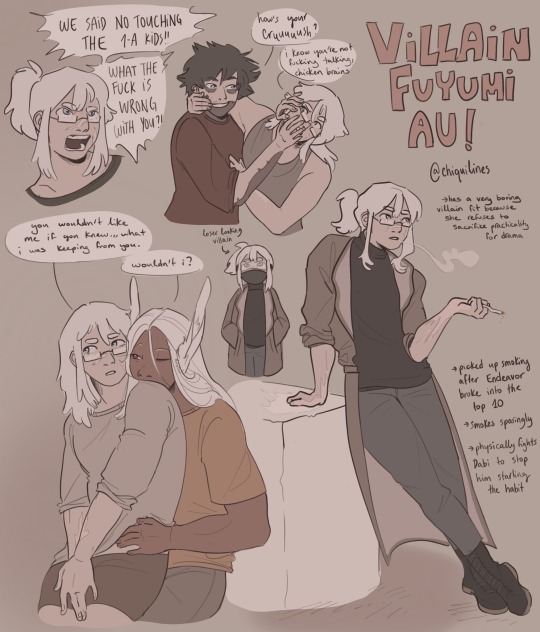
I really love this AU if you couldn't tell
#listen its always tempting#and i do love a good unhinged villain#but fuyumi would be so very level headed#might be why my go to palette for her is beiges#<- does that make sense#like ik she would refuse cool fun villain costumes like dabi#cause she is NOT getting caught because she wanted fishnets#its practical or nothing w her#big sister syndrome#anyways I maintain that she would be violently against going after children#esp shoutos class obviously#and i believe shed recruit dabi to her cause#theyre like this🤞 in this au#i want them to have a good silly sibling dynamic SO BAD#and i mean miruko#self explanatory#theyre just living their lil telenovela in the corner while the LOV and HPSC burn around them#'oh we shouldnt😔' 'oh but my soul yearns for you🥺'#dumbasses#love them#fuyumi todoroki#usagiyama rumi#miruko#miryumi#mha#bnha#my hero academia#boku no hero academia#wlw#chiquilines draws
109 notes
·
View notes
Text
could people who think Critical Role has Lost The Magic (TM) because it's no longer livestreamed and the people who throw endless sobbing fits about having three weeks off from the main campaign in the main tag all fight each other and leave the rest of us in peace finally
#in all seriousness people who think the former are creepily parasocial#(or are just mad at post-hiatus C2 and at C3 and need to get over themselves)#and people who think the latter DEFINITELY need to go to therapy and also usually remedial literature class like#if your mental health actually hinges on this please get help and if you're joking about it...maybe keep that an inside thought#also nothing is happening to the party for the time we do not see them. they do not exist when not onscreen bc fiction. hope this helps
73 notes
·
View notes
Text

Cozyyy😊
#korrasami#persnickety doodles#alicia draws#they cancelled classes this whole week and assignments have been pushed a week out so I’ve nothing else to do but draw and play gamesss#I like the cold but ice storms suck ngl#I prefer fluffy snow because at least we can drive in it#and I can snowboard hehehe#Texas sucks and I can’t wait to moooveeee#lok#avatar
284 notes
·
View notes
Text
i won’t hold people to the same standards i have on myself in terms of friendship bc everyone shows they care in different ways
#this is a part affirmation and part intro to a rant i need to unleash#but i’ll leave it in the tags here bc it feels safer lol#it’s abt my housemate the other day when we had our last class which is online but our previous classes were in person so as a class we#usually just pull it up on the main computer and broadcast the zoom in the classroom#but on this day the class before this zoom class got out early so lots of people went home early to just watch it on their own zoom or wtvr#so the row i sit in was pretty empty except for me my housemate and our two friends#and usually my housemate sits on my right but she got up and moved to sit on the other side next to our other friend and said nothing#and i didn’t want to say anything bc i was kinda sad/offended even though#her moving seats probably has nothing to do with me and much rather her personal preference i can’t help but think negatively abt myself#also one morning we were both off she went to the smoothie shop and coffee shop and just went to pick up her orders and i felt the same#reaction of like sad/offended bc she didn’t consider me at al like what if i wanted a smoothie too! TF#or coffee even though i don’t drink coffee anymore wtvr#my thoughts on her and my friendship are kinda rocky bc we feel so out of sync#i feel like she’s always in her own world and it’s hard to get through to her and become real friends#it’s whatever not all friendships can be deep and meaningful
41 notes
·
View notes
Text
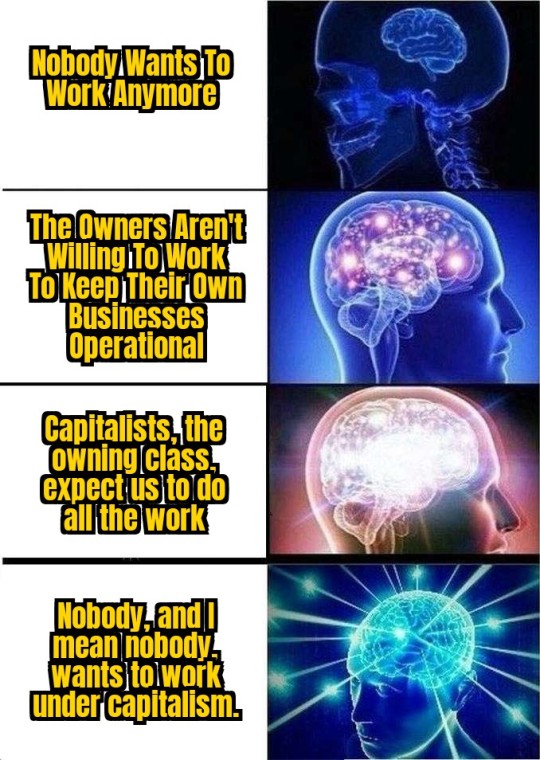
#anti capitalist#capitalism#taking the L#nobody wants to work anymore#fuck the patriarchy#fuck the man#fuck capitalism#labor rights#We Are Literally Financing A Class Of People Who Do Nothing To Better Humanity#The 1% are the real welfare queens#antiwork#punk#leftist#communism#anarchism#anarchy#eat the rich
21 notes
·
View notes
Text
a closeted 20 year old that comes from a conservative rural family falling in love with a openly gay 18 year old on spanish prime tv
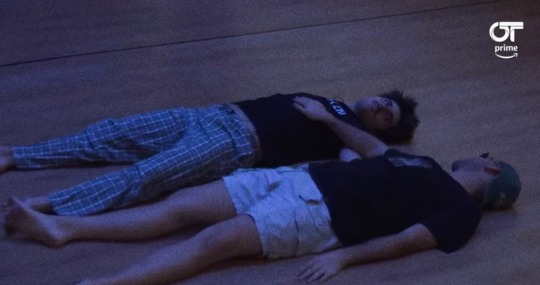

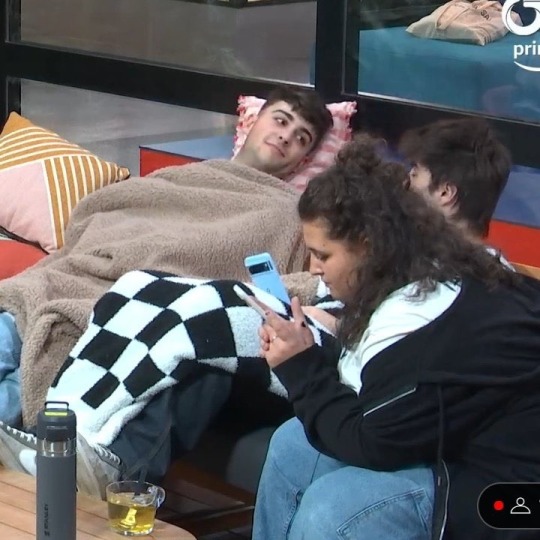
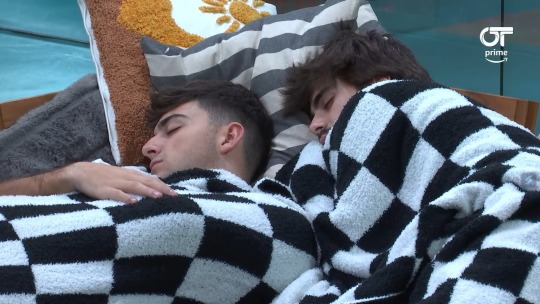
#a bit of background:#this is operacion triunfo a spanish tv show about sing! there are 16 contestants and they have to sing every monday a song#so they live in like a school academy where they have each day classes related to music (and they also rehearsal the song the have to#perform the mondays)#okay and like they have 0 connection with the rest of the world (they have phones but with no internet) so they know nothing about#what’s happening outside#SO there’s a youtube channel where they show each day what these contestants are doing (like big brother but related to music)#so um u get really attached to them cause u see them 24h!!!#so one of this contestants is juanjo (the one with the 🧢) and comes from a rural village and his fam is a bit conservative so he never#speaks about his sexuality - all the opposite he’s a bit ashamed of what he is bc he’s now used to act like himself#and then there is martin who is 18 and openly gay and like super open about all this topic super comfortable with himself etc#so this show has been going on for 3 weeks now okay? and in the first week u could see something was going on between these two#but since juanjo is so ashamed of this he rejected every type of touch that came for martin#martin got all ☹️ and he kinda told his friends there that he was having something with juanjo and he wasn’t receptive#(WE WERE SCREAMING IN TWITTER)#well since that moment it has been a fucking rollercoaster but juanjo is now a chiller and they cuddle and flirt in from of everyone#(they even have showers together cause rip they have 0 intimacy)#okay but today has been!!!! PUNTO DE INFLEXIÓN#juanjo has fallen in love so deeply with martin that oh god he needs to be by his side all the time omgomg#and yeah this vid happened tonight while their friends were singing and all twitter cried
23 notes
·
View notes
Text


I'm going to start eating glass
#my art#the gamecube is fucked and idek why#same with some of the corners on the TV but hey we're going to ignore thattt#I need to stop doing these the night before they're due#because I end up not sleeping and then when I'm in class I absorb nothing#thankfully the prof has old recorded lectures on the canvas page. I really should watch all of them#this is steven's bedroom from steven universe btw#my sister is taking the class with me#she modeled Sophie's room from Howl's Moving Castle#and we gotta fistfight /j because her render looks nicer than mine#I would not be surviving this class if not for her
26 notes
·
View notes